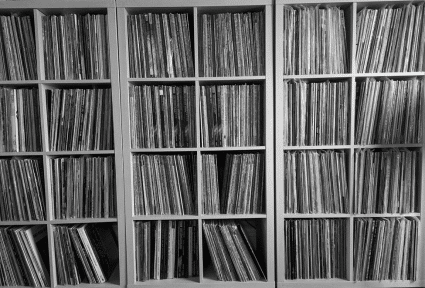.
.
The Sunday Poem is published weekly, and strives to include the poet reading their work.
Bryan Franco reads his poem at its conclusion.
.
.
___
.
.

.
.
How I Achieved Levitation
They all lived in the Walnut Building.
Satchmo blew the roof off the house.
Fats Waller tickled ivories.
Dizzy Gillespie flugled.
Billy Holiday wailed.
Ella Fitzgerald scatted.
Sarah Vaughn redefined divine with sassy.
Lena Horne created paradise from stormy weather.
Sinatra crooned.
Sammy Davis Junior played every instrument with unmitigated cool.
Ray Charles saw the world through his songs.
Harry Belafonte dayo’ed.
Benny Goodman swung.
Tommy Dorsey tromboned.
Buddy Rich drummed.
Stan Getz saxed.
Woody Herman clarinetted.
Spike Jones orchestrated unconventionality.
Leadbelly sat on stool singing the blues.
Barbara Streisand was there churning buttah.
The Walnut Building had no elevator.
All its occupants were made of vinyl
protected by paper sleeves then cardboard sleeves.
They were carefully removed from cardboard then paper
then placed onto a turntable then a needle found their grooves
then music and voices emanated from speakers.
I’d watch my father siting in Mr. Chair,
his leather Eames knock-off,
breathing in through his nose as if
he were breathing in fresh mountain air.
He’d close his eyes, lean back,
tap his feet on the orange shag carpeting,
and lightly snap his fingers.
He existed in the chair, but he levitated.
In the family room of the Franco House at
305 Fern Hill Court in Mobile, Alabama
to the left of the 1960’s Danish-modern wall unit
was the Walnut Building, 5 solid-walnut cubes
stacked one-on-top-of-another just shy of six feet tall,
each cube with dozens of cardboard-sleeved LP’s
(mostly 331/3’s and maybe a half-dozen 78’s.)
2 1/2 years after dad died, when I came home
from New York to Alabama when mom was moving
to a patio home, I decided the cubes were an apartment building
in Hell’s Kitchen or maybe Soho (decades before Soho was trendy).
The musicians and vocalists held impromptu jam sessions
creating masterpieces that happened once,
never to be recorded for the masses,
never to become legendary performances
at Newport, Monterey, or Montreux.
The night I flew in, I sat in Dad’s chair and existed
in the same room with the residents of the Walnut Building;
the needle grooved into the vinyl;
I sunk into Mr. Chair’s weathered leather,
reclined, closed my eyes, and levitated.
.
Listen to Bryan Franco read his poem
.
.
___
.
.
Bryan Franco is a gay, Jewish poet from Brunswick, Maine who competed in the 2014 National Poetry Slam in Oakland, California. He has been published in the US, Australia, England, Germany, India, Ireland, and Scotland. He has facilitated poetry workshops for Brunswick High School, Tumblewords Project, and Phynnecabulary. He hosts Café Generalissimo Open Mic, is a member of the Beardo Bards Of The Bardo poetry troupe, painter, sculptor, gardener, and culinary genius. His book Everything I Think Is All in My Mind was published in 2021.
.
.
Listen to the 1930 recording of Fats Waller performing “After You’ve Gone” [The Orchard]
.
.
___
.
.
Click here to read previous editions of The Sunday Poem
Click here to read “A Collection of Jazz Poetry – Summer, 2023 Edition”
Click here for information about how to submit your poetry or short fiction
Click here to subscribe to the (free) Jerry Jazz Musician quarterly newsletter
Click here to help support the ongoing publication of Jerry Jazz Musician, and to keep it commercial-free (thank you!)
.
___
.
.
Jerry Jazz Musician…human produced (and AI-free) since 1999
.
.
.





























